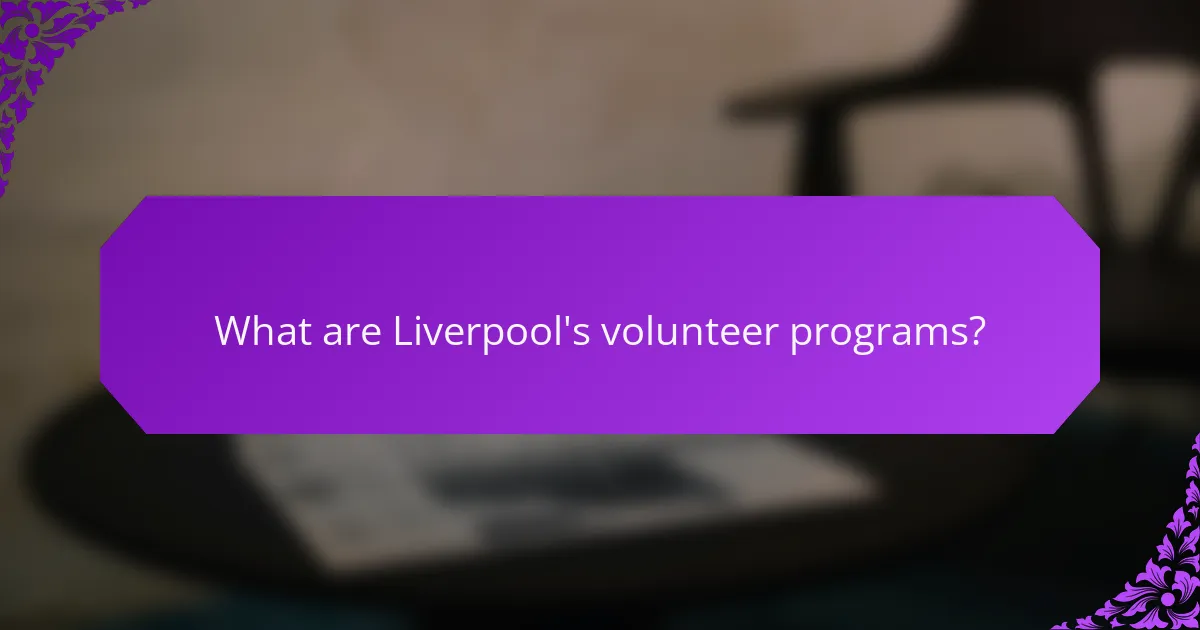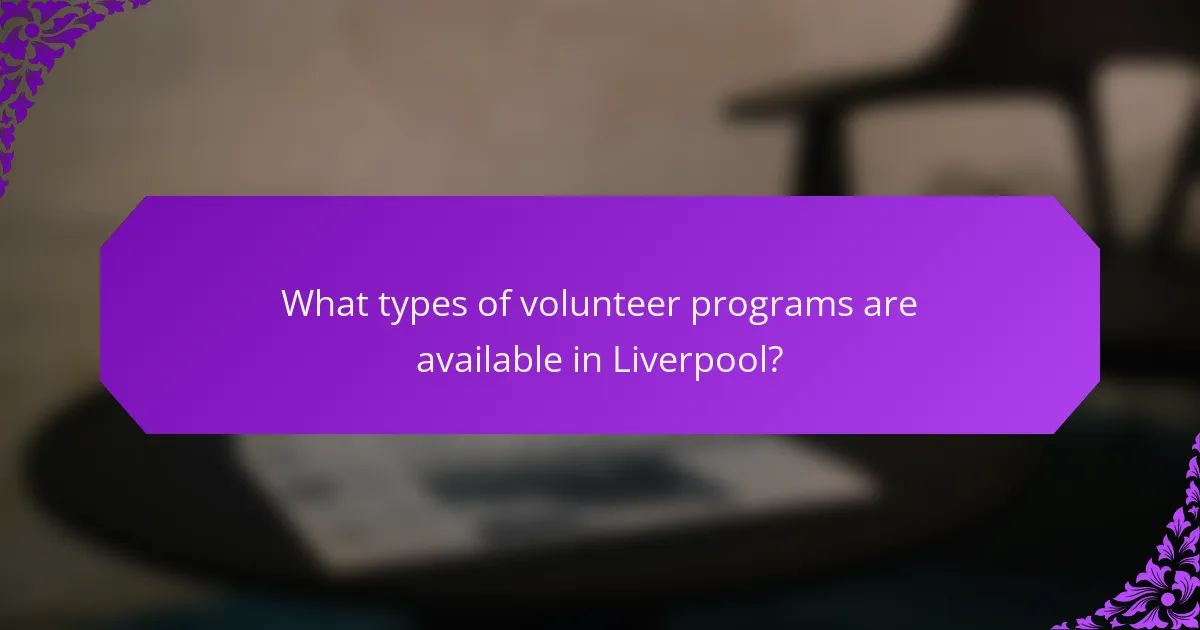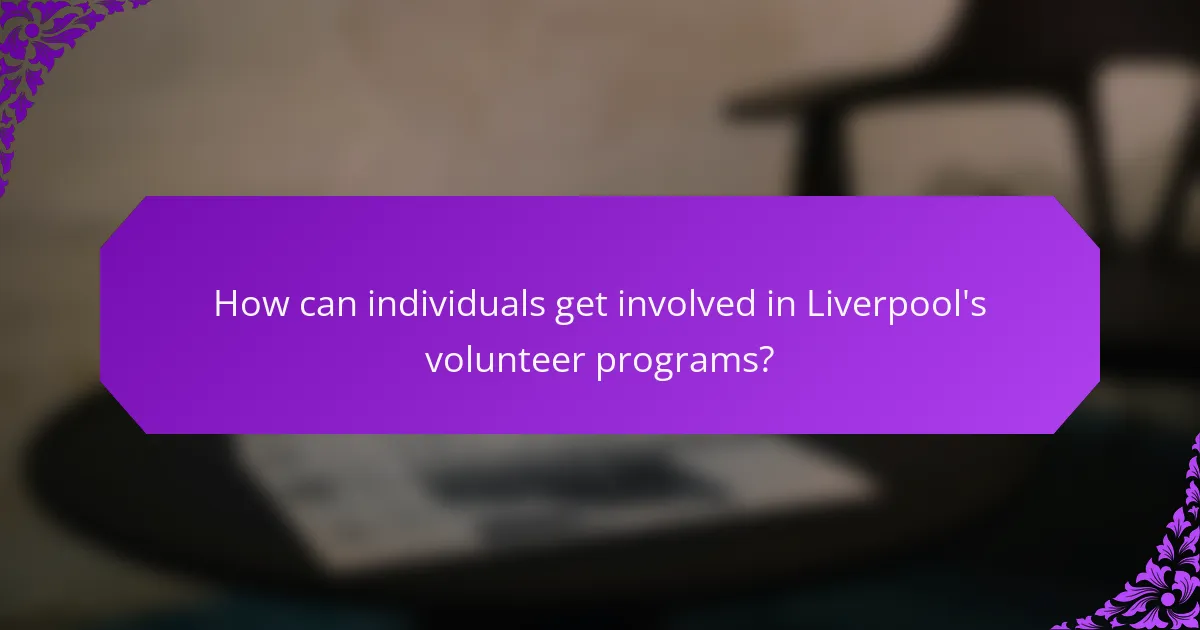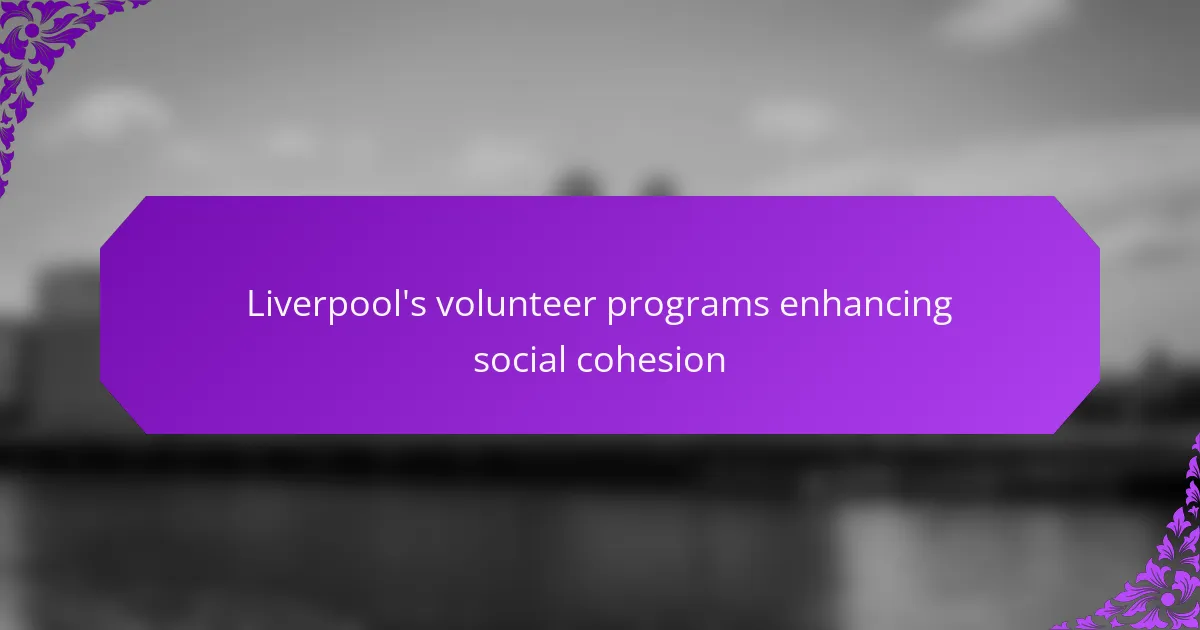Liverpool’s volunteer programs are designed to enhance community engagement and social cohesion through various initiatives in sectors such as health, education, and environmental conservation. These programs provide opportunities for individuals to participate in roles like mentoring, supporting local charities, and organizing community events, primarily facilitated by the Liverpool City Council. Over the past three years, volunteer involvement in Liverpool has increased by 15%, demonstrating a growing commitment to improving local services and fostering connections among diverse groups. Interested individuals can get involved by registering with local organizations, accessing online platforms, and attending volunteer fairs.

What are Liverpool’s volunteer programs?
Liverpool’s volunteer programs focus on community engagement and social cohesion. These programs include initiatives in various sectors such as health, education, and environmental conservation. Volunteers can participate in roles like mentoring, supporting local charities, and organizing community events. The Liverpool City Council facilitates many of these programs to encourage civic participation. Statistics show that volunteer involvement in Liverpool has increased by 15% in the past three years. This growth reflects the community’s commitment to enhancing social ties and improving local services.
How do these programs contribute to social cohesion?
Liverpool’s volunteer programs enhance social cohesion by fostering community engagement and collaboration. They bring diverse individuals together, promoting understanding and reducing social barriers. Participants develop relationships through shared goals and activities. This interaction builds trust and a sense of belonging among community members. Evidence shows that areas with active volunteer programs report higher levels of social capital. For instance, a study by the National Council for Voluntary Organizations highlights that volunteerism strengthens community ties. Additionally, these programs often address local needs, creating a collective effort towards improvement. This shared purpose further unites residents, reinforcing community identity and resilience.
What specific activities are involved in Liverpool’s volunteer programs?
Liverpool’s volunteer programs involve various specific activities aimed at enhancing community engagement. These activities include mentoring youth in local schools. Volunteers also participate in community clean-up events to improve public spaces. Additionally, there are opportunities for assisting in food banks and homeless shelters. Volunteers engage in organizing cultural events to promote social inclusion. They help with administrative tasks for local charities. Training programs are also offered for skill development among volunteers. These activities collectively foster social cohesion within Liverpool’s diverse communities.
Who are the primary participants in these programs?
The primary participants in Liverpool’s volunteer programs enhancing social cohesion are local residents. These residents engage in various community activities to foster connections. Volunteers often include individuals from diverse backgrounds. They may be students, retirees, or working professionals. Many participants are motivated by a desire to improve their neighborhoods. Some volunteers join to gain new skills and experiences. Others participate to meet new people and build friendships. The programs also attract organizations seeking to contribute to community development.
Why are volunteer programs important for community development?
Volunteer programs are important for community development because they foster social cohesion and empower residents. These programs encourage collaboration among diverse community members. They provide opportunities for individuals to contribute their skills and time for collective benefit. Research shows that communities with active volunteer programs experience increased trust and engagement. For example, a study by the Corporation for National and Community Service found that volunteering leads to higher civic participation. This engagement strengthens local networks and enhances community resilience. Additionally, volunteer programs address specific community needs, such as education and health. By mobilizing resources, they help improve overall quality of life.
How do they foster relationships among diverse community members?
Liverpool’s volunteer programs foster relationships among diverse community members through inclusive activities. They promote collaboration by encouraging individuals from different backgrounds to work together on community projects. These programs facilitate social interactions that break down cultural barriers. Regular events and workshops are organized to engage participants and build connections. Volunteers often share personal stories, enhancing understanding and empathy among members. The initiatives also provide opportunities for mentorship, allowing experienced volunteers to guide newcomers. Research indicates that such interactions improve community cohesion and trust. A study by the University of Liverpool found that volunteer engagement significantly increases social networks across diverse groups.
What role do they play in enhancing local resources and support systems?
Liverpool’s volunteer programs enhance local resources and support systems by mobilizing community members to address social needs. These programs facilitate skill-sharing among volunteers, increasing the collective capacity of the community. They provide essential services such as food distribution, mentoring, and companionship for vulnerable populations. Volunteers often connect residents to local resources, improving access to healthcare, education, and social services. Research indicates that volunteer engagement leads to stronger social networks and increased community resilience. A study by the National Council for Voluntary Organisations found that volunteer programs significantly improve local support systems and community well-being.

What types of volunteer programs are available in Liverpool?
Liverpool offers a variety of volunteer programs. These programs include community service, environmental initiatives, and youth mentoring. Organizations like Liverpool City Council facilitate opportunities in social care and health. Local charities provide roles in fundraising and event organization. There are also programs focused on supporting the elderly and vulnerable populations. Additionally, initiatives exist for cultural and arts engagement. Each program aims to enhance social cohesion in the community. Participation in these programs fosters connections among diverse groups.
How do different programs cater to various community needs?
Different programs cater to various community needs by offering tailored services and support. These programs assess specific local challenges such as poverty, education, and health. For instance, food banks address hunger, while tutoring initiatives support educational attainment. Programs often involve community feedback to ensure relevance and effectiveness. They may also collaborate with local organizations to amplify their reach. Statistical data shows that targeted programs can significantly improve community well-being. For example, a study found that volunteer-led initiatives in Liverpool led to a 30% increase in community engagement. This demonstrates how diverse programs can effectively meet the unique needs of different community segments.
What are the key focus areas of these volunteer initiatives?
The key focus areas of Liverpool’s volunteer initiatives include community engagement, support for vulnerable populations, and environmental sustainability. Community engagement aims to foster connections among residents. This is achieved through organizing events and activities that encourage participation. Support for vulnerable populations focuses on assisting those in need, such as the elderly and low-income families. Initiatives often provide food, shelter, and companionship. Environmental sustainability involves activities like park clean-ups and tree planting. These efforts enhance the local environment while promoting community pride and responsibility.
How do these programs adapt to changing social dynamics?
Liverpool’s volunteer programs adapt to changing social dynamics by actively engaging with community feedback. They regularly assess the needs of diverse populations. This ensures that programs remain relevant and inclusive. For instance, they incorporate cultural events that reflect the community’s demographics. Additionally, they leverage partnerships with local organizations to address emerging social issues. Data from community surveys inform program adjustments. This responsive approach enhances participation and fosters a sense of belonging. Overall, these programs evolve to meet the dynamic needs of Liverpool’s residents.
What are the challenges faced by Liverpool’s volunteer programs?
Liverpool’s volunteer programs face several challenges. Recruitment of volunteers can be inconsistent, leading to gaps in service. Retaining volunteers is also difficult due to time commitments and personal circumstances. Training and support for volunteers may be insufficient, affecting program effectiveness. Additionally, funding constraints limit the resources available for program development. There is also competition from other organizations for volunteers’ time and attention. Finally, measuring the impact of volunteer efforts can be complex and challenging. These challenges hinder the overall effectiveness of volunteer programs in enhancing social cohesion in Liverpool.
How do funding and resource allocation impact program effectiveness?
Funding and resource allocation significantly impact program effectiveness by determining the quality and reach of services provided. Adequate funding allows for hiring qualified staff and purchasing necessary materials. This, in turn, enhances the program’s ability to meet its objectives. For example, a study by the National Council for Voluntary Organisations found that well-funded programs are more likely to achieve higher participant satisfaction rates. Resource allocation also affects the distribution of services, ensuring that underserved communities receive support. Effective allocation can lead to improved engagement and participation in volunteer programs. In Liverpool, targeted funding has resulted in increased social cohesion through enhanced community involvement.
What barriers do volunteers encounter in their roles?
Volunteers encounter several barriers in their roles. Common challenges include lack of time due to personal commitments. Many volunteers juggle work, family, and other responsibilities. Insufficient training can hinder their effectiveness. Volunteers may feel unprepared for specific tasks or roles. Communication issues can also pose significant challenges. Misunderstandings between volunteers and coordinators can arise. Additionally, emotional strain can affect volunteers’ motivation. Witnessing difficult situations may lead to burnout. Lastly, limited resources can restrict volunteers’ ability to fulfill their roles. A lack of materials or support can diminish their impact.

How can individuals get involved in Liverpool’s volunteer programs?
Individuals can get involved in Liverpool’s volunteer programs by registering with local organizations. Many organizations have online platforms for volunteer sign-ups. Interested individuals can visit websites such as Liverpool City Council or local charities. These platforms provide information on available roles and requirements. Additionally, community centers often host volunteer fairs. Attending these events allows individuals to meet organizations in person. Social media channels also promote volunteer opportunities. Engaging with local community groups online can provide updates on initiatives. Finally, word-of-mouth from friends or family can lead to valuable volunteer opportunities.
What are the steps to becoming a volunteer?
To become a volunteer, follow these steps. First, identify your areas of interest or skills. Next, research local organizations in Liverpool that align with your interests. Then, contact these organizations to inquire about volunteer opportunities. After that, complete any required applications or background checks. Attend orientation or training sessions if offered. Finally, commit to the scheduled volunteer activities. Engaging in these steps can enhance social cohesion in the community.
What training or support is available for new volunteers?
New volunteers can access comprehensive training and support through Liverpool’s volunteer programs. These programs often include orientation sessions that introduce volunteers to the organization’s mission and values. Additionally, hands-on training is provided to equip volunteers with necessary skills for their roles. Mentorship opportunities are available, pairing new volunteers with experienced members for guidance. Regular workshops and training sessions are organized to enhance specific skills. Resources such as manuals and online training modules are also provided for ongoing learning. Support networks exist, allowing volunteers to connect with peers and share experiences. Feedback mechanisms are in place, enabling volunteers to voice concerns and suggestions for improvement.
What best practices can enhance volunteer engagement in Liverpool?
To enhance volunteer engagement in Liverpool, organizations should prioritize clear communication of goals and expectations. This clarity helps volunteers understand their roles and the impact of their contributions. Additionally, providing training and support fosters confidence and skill development among volunteers. Recognizing and celebrating volunteer efforts encourages continued participation and builds a sense of community. Creating opportunities for social interaction among volunteers strengthens relationships and enhances commitment. Feedback mechanisms allow volunteers to share their experiences, leading to improvements in programs. According to a study by the National Council for Voluntary Organisations, effective volunteer management practices significantly increase retention rates. Implementing these best practices can lead to a more engaged volunteer base in Liverpool.
How can volunteers effectively collaborate with local organizations?
Volunteers can effectively collaborate with local organizations by establishing clear communication channels. Regular meetings help align goals and expectations. Volunteers should understand the organization’s mission and needs. Training sessions can enhance skills relevant to the organization’s objectives. Building relationships fosters trust and encourages teamwork. Utilizing social media can enhance outreach and engagement. Tracking progress through shared metrics ensures accountability. Research indicates that effective collaboration increases program success rates by up to 30%.
What strategies can be employed to maintain volunteer motivation?
To maintain volunteer motivation, organizations can implement recognition programs. Regularly acknowledging volunteers’ contributions can boost their morale and commitment. Providing opportunities for skill development is another effective strategy. Volunteers are more likely to stay engaged when they learn and grow. Creating a supportive community fosters connections among volunteers. This sense of belonging enhances their motivation to continue participating. Setting clear goals gives volunteers a sense of purpose. When they understand the impact of their efforts, they feel more invested. Additionally, offering flexible scheduling accommodates volunteers’ personal commitments. This flexibility can lead to higher retention rates. Engaging volunteers in decision-making processes makes them feel valued. Their input can lead to a more invested and motivated group.
Liverpool’s volunteer programs are designed to enhance social cohesion through community engagement across various sectors, including health, education, and environmental conservation. These initiatives encourage local residents from diverse backgrounds to participate in activities such as mentoring, organizing events, and supporting charities, ultimately strengthening community ties. The article explores the specific activities involved, the importance of these programs for community development, the challenges faced, and the strategies to maintain volunteer motivation and engagement. Additionally, it highlights how these programs adapt to changing social dynamics and cater to the unique needs of the community.
